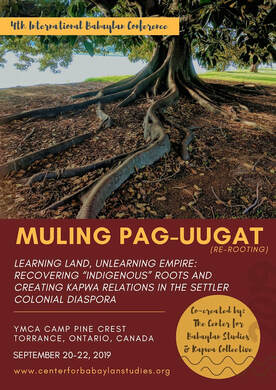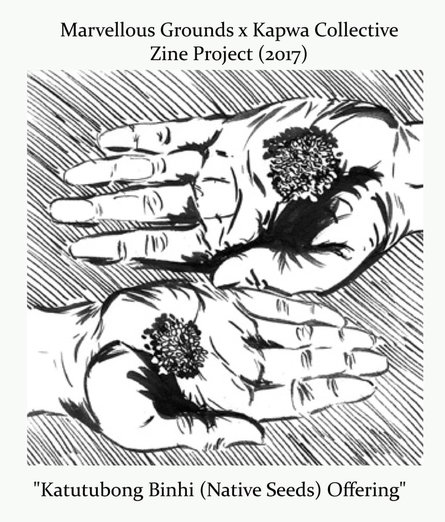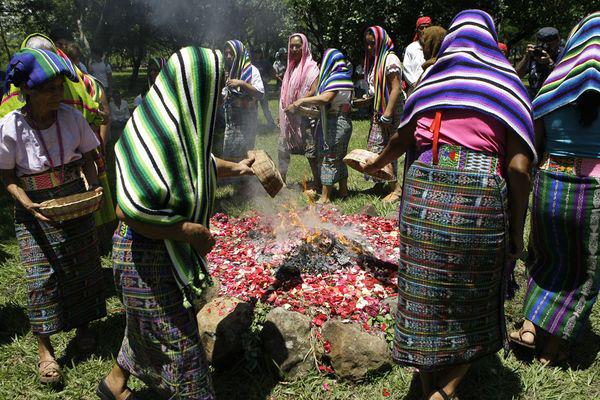Kapwa Collective: together we dream our vision for a filipinx-canadian bridging narrative into action
Kapwa Collective is a group of Filipinx* Canadian artists, critical thinkers, and healers who work towards bridging narratives between the Indigenous and the Diasporic, and the Filipinx and the Canadian. We facilitate links among academic, artistic, activist, and other communities in Toronto. Kapwa Collective functions as a mutual support group based on the core value of “kapwa”.
Virgilio G. Enriquez, known as the founder of Sikolohiyang Pilipino (Filipino Psychology), initially proposed a concept of personhood centered on the core value expressed in the word kapwa, as described by the scholar Katrin de Guia:
"Kapwa is a Tagalog term widely used when addressing another with the intention of establishing a connection. It reflects a viewpoint that beholds the essential humanity recognizable in everyone, therefore linking (including) people rather than separating (excluding) them from each other. Enriquez felt that this orientation was an expression of ‘humanness at its highest level’."
- from Kapwa: The Self in the Other, Worldviews and Lifestyles of Filipino Culture-Bearers
Kapwa Collective believes it is important to create links with the Indigenous Peoples of the Philippines, Canada and around the world, as we seek to understand our own place in the world as People of the Diaspora and Settlers on Turtle Island. Increasingly, we understand that incorporating Indigenous knowledge, systems, beliefs, and practices is important towards our survival as a species in this world that is in a deep ecological crisis.
Since 2012, Kapwa Collective has participated in international collaborations including the KAPWA-3 Conference on Indigenous People in the Academe (Baguio City, Philippines, 2012), the Center for Babaylan Studies (CfBS) Second International Babaylan Conference/Gathering - “Katutubong Binhi/Native Seeds: Myths and Stories that Feed our Indigenous Soul” (Westminister Woods, U.S.A., 2013), CfBS Symposium - “Panaghinabi: Fruitful Conversations, Bridging Indigenous and Christian Traditions of Spirituality” (Glouster, U.S.A., 2015), and the CfBS Third International Babaylan Conference/Gathering - "Makasaysayang Pagtatagpo (Historic Encounters): Filipinos and Turtle Islanders Revitalizing Ancestral Traditions Together" (Unceded Coast Salish Territories, Sunshine Coast, Canada 2016).
We have also explored indigeneity with local communities including Anakbayan Toronto, Conscious Minds Camp, Diasporic Intimacies: Queer Filipinos/as and Canadian Imaginaries, Female Eye Film Festival, imagineNATIVE Film + Media Arts Festival, and Musagetes.
Some of our past projects include B A T O K (Kalinga Tattoo) Markers of Identity: From Indigenous to Diasporic (2012); TBOLIxTO - a cultural exchange between the Lake Sebu School of Living Traditions (Philippines) and the community in Toronto (2014); Restless Precinct - a site specific project on land, indigeneity, and decolonization in Scarborough's Guild Precinct (2014); CMC Magazine Issue 1: Womxn. / / / An offering (2016); and "Katutubong Binhi (Native Seeds) Offering" (2017) a zine created as part of Marvellous Grounds - a project that seeks to document and create space to vision the ways that QTBIPOC (queer and trans Black, Indigenous and people of colour) create communities, innovate projects and foster connections within Toronto/Three Fires Territories and beyond.
We are honoured to have the guidance of indigenous and Filipinx community leaders including:
Virgilio G. Enriquez, known as the founder of Sikolohiyang Pilipino (Filipino Psychology), initially proposed a concept of personhood centered on the core value expressed in the word kapwa, as described by the scholar Katrin de Guia:
"Kapwa is a Tagalog term widely used when addressing another with the intention of establishing a connection. It reflects a viewpoint that beholds the essential humanity recognizable in everyone, therefore linking (including) people rather than separating (excluding) them from each other. Enriquez felt that this orientation was an expression of ‘humanness at its highest level’."
- from Kapwa: The Self in the Other, Worldviews and Lifestyles of Filipino Culture-Bearers
Kapwa Collective believes it is important to create links with the Indigenous Peoples of the Philippines, Canada and around the world, as we seek to understand our own place in the world as People of the Diaspora and Settlers on Turtle Island. Increasingly, we understand that incorporating Indigenous knowledge, systems, beliefs, and practices is important towards our survival as a species in this world that is in a deep ecological crisis.
Since 2012, Kapwa Collective has participated in international collaborations including the KAPWA-3 Conference on Indigenous People in the Academe (Baguio City, Philippines, 2012), the Center for Babaylan Studies (CfBS) Second International Babaylan Conference/Gathering - “Katutubong Binhi/Native Seeds: Myths and Stories that Feed our Indigenous Soul” (Westminister Woods, U.S.A., 2013), CfBS Symposium - “Panaghinabi: Fruitful Conversations, Bridging Indigenous and Christian Traditions of Spirituality” (Glouster, U.S.A., 2015), and the CfBS Third International Babaylan Conference/Gathering - "Makasaysayang Pagtatagpo (Historic Encounters): Filipinos and Turtle Islanders Revitalizing Ancestral Traditions Together" (Unceded Coast Salish Territories, Sunshine Coast, Canada 2016).
We have also explored indigeneity with local communities including Anakbayan Toronto, Conscious Minds Camp, Diasporic Intimacies: Queer Filipinos/as and Canadian Imaginaries, Female Eye Film Festival, imagineNATIVE Film + Media Arts Festival, and Musagetes.
Some of our past projects include B A T O K (Kalinga Tattoo) Markers of Identity: From Indigenous to Diasporic (2012); TBOLIxTO - a cultural exchange between the Lake Sebu School of Living Traditions (Philippines) and the community in Toronto (2014); Restless Precinct - a site specific project on land, indigeneity, and decolonization in Scarborough's Guild Precinct (2014); CMC Magazine Issue 1: Womxn. / / / An offering (2016); and "Katutubong Binhi (Native Seeds) Offering" (2017) a zine created as part of Marvellous Grounds - a project that seeks to document and create space to vision the ways that QTBIPOC (queer and trans Black, Indigenous and people of colour) create communities, innovate projects and foster connections within Toronto/Three Fires Territories and beyond.
We are honoured to have the guidance of indigenous and Filipinx community leaders including:
- Amy Desjarlais (nee Tabobandung), Waabaakakazhe zhaashkeezgokwe (White Raven Woman with Turquoise eyes) Amik Dodem (Beaver Clan) Wasauksing First Nation - knowledge keeper. Ojibwe/Potowottmi Anishinaabe
- Center for Babaylan Studies
- Martha Ocampo
- Laini Lascelles (Lanaape Traditional Healer and Wolf Clan member)
- Lagitan Mamerto Tindongan, Mumbaki (Ifugao)
- Lee Maracle (Stö:lo Nation)
- Maria Montejo (Mam Jakaltec / Popti Indigenous Knowledge Keeper)
|
4th International Babaylan Conference Co-presented by Center for Babaylan Studies and Kapwa Collective Muling Pag-Uugat (Re-Rooting) Learning Land, Unlearning Empire: Recovering “Indigenous” Roots and Creating Kapwa Relations in the Settler Colonial Diaspora September 20-22, 2019 YMCA Camp Pine Crest Torrance, Ontario, Canada WAHTA KANIEN’KEHA:KA TERRITORY Learn more |
Marvellous Grounds x Kapwa Collective
|
Planting B N E K : S E E D S that nourish our indigenous souls
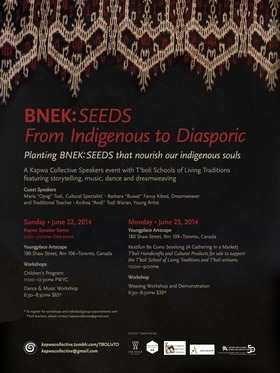
Kapwa Collective Speakers Series (June 2014)
B N E K : S E E D S
From the Indigenous to the Diasporic
Kapwa Collective presents B N E K : S E E D S - a cultural exchange between the T’boli School of Living Traditions (Philippines) and communities in Toronto featuring storytelling, music, dance, and weaving. Maria "Oyog" Todi (Cultural Specialist), Barbara "Buwat" Ofong (Dreamweaver) and Andi Todi Wanan (Student/Artist) will share knowledge about T’boli Indigenous Knowledge Systems and Practices. Events will include workshops, cultural presentations, and a children’s program open to the public!
S T A Y I N F O R M E D
www.kapwacollective.tumblr.com
www.facebook.com/kapwacollective
B N E K : S E E D S
From the Indigenous to the Diasporic
Kapwa Collective presents B N E K : S E E D S - a cultural exchange between the T’boli School of Living Traditions (Philippines) and communities in Toronto featuring storytelling, music, dance, and weaving. Maria "Oyog" Todi (Cultural Specialist), Barbara "Buwat" Ofong (Dreamweaver) and Andi Todi Wanan (Student/Artist) will share knowledge about T’boli Indigenous Knowledge Systems and Practices. Events will include workshops, cultural presentations, and a children’s program open to the public!
S T A Y I N F O R M E D
www.kapwacollective.tumblr.com
www.facebook.com/kapwacollective
Meeting With Our Ancestors
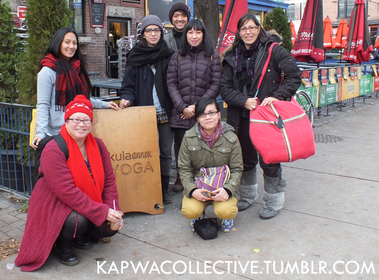
On Sunday, November 10, 2013 the Kapwa Collective held a retreat, Meeting with Our Ancestors facilitated by Laini Lascelles (also known as Good Spirit Woman), a Lanaape Traditional Healer and Wolf Clan member.
Laini has worked in the First Nations community on and off reserve for several years, as a addiction and mental health counsellor. During this time she gained strength and knowledge through the traditional ways, advocating for success and positive solutions in the First Nations communities.
In Tkaronto, Laini attended Kokorodojo for Shiatsu training that promotes healing and wellness. This was where she was first recognized as a healer and was encouraged to pursue these gifts.
Laini now combines traditional counselling with Shiatsu with her own business, Good Spirit Healing & Wellness. She shares wisdom based on traditional teachings, beliefs, and practices of the Ancestors. She offers healing experiences through the gift of finding harmony and balance in the body.
Meeting with Our Ancestors was a space for the Kapwa Collective to learn with Laini. We explored ways the collective can holistically process the ancestral knowledge received and ways to manifest ideas and dreams within our own selves and in our community.
We acknowledged that our medicine is in our language, songs & music, herbal & plant medicine, rituals, prayers, and dreams. Healing can be found in the process of recovering our own personal stories and ancestry.
Miigwech / Maraming Salamat / Many Thanks to Laini for gifting Kapwa Collective with teachings, and sharing stories and knowledge together.
Laini has worked in the First Nations community on and off reserve for several years, as a addiction and mental health counsellor. During this time she gained strength and knowledge through the traditional ways, advocating for success and positive solutions in the First Nations communities.
In Tkaronto, Laini attended Kokorodojo for Shiatsu training that promotes healing and wellness. This was where she was first recognized as a healer and was encouraged to pursue these gifts.
Laini now combines traditional counselling with Shiatsu with her own business, Good Spirit Healing & Wellness. She shares wisdom based on traditional teachings, beliefs, and practices of the Ancestors. She offers healing experiences through the gift of finding harmony and balance in the body.
Meeting with Our Ancestors was a space for the Kapwa Collective to learn with Laini. We explored ways the collective can holistically process the ancestral knowledge received and ways to manifest ideas and dreams within our own selves and in our community.
We acknowledged that our medicine is in our language, songs & music, herbal & plant medicine, rituals, prayers, and dreams. Healing can be found in the process of recovering our own personal stories and ancestry.
Miigwech / Maraming Salamat / Many Thanks to Laini for gifting Kapwa Collective with teachings, and sharing stories and knowledge together.
Baybayin (The Script) premieres at imagineNATIVE
October 17, 2013
Kapwa Collective was honoured to co-present "Baybayin (The Script)" in partnership with the imagineNATIVE Film + Media Arts Festival. Set in the lush and pristine landscape of the Palawan territory, a dramatic and sensual story of love and loss unfolds. Two half-sisters are separated as children upon their mother’s death; the younger sister is taken to Canada by her European father, while the other remains on their traditional land. Divided by time and cultures, the sisters are reunited as adults and must rediscover the bonds that once held them close. Amidst growing threats to their way of life, the sisters are forced to reconcile a shared love for Bagtik, a deaf-mute man whose only way of communicating is the Baybayin, an ancient Palawanon script. Filled with sensuality and steeped deeply in Indigenous Palawan storytelling, celebrated filmmaker and indigenous rights activist, Kanakan Balintagos returns to imagineNATIVE with his latest, remarkable feature film.
"I'm just so happy that the Kapwa Collective is here, because I believe that the Filipinos in diaspora are the hope of the Philippines. Filipinos have this colonial mentality and they keep looking to the West, to North America. If these young people, this Kapwa Collective looks back - if these Filipinos in the diaspora go back and respect, and love our indigenous culture - then there will be a fire, that will ignite, what we truly are." - Kanakan Balintagos at the International Premiere of Baybayin
Read the Philippine Reporter article:
http://philippinereporter.com/2013/10/25/ancient-palawan-traditions-come-to-toronto-through-solito-film/
Kapwa Collective was honoured to co-present "Baybayin (The Script)" in partnership with the imagineNATIVE Film + Media Arts Festival. Set in the lush and pristine landscape of the Palawan territory, a dramatic and sensual story of love and loss unfolds. Two half-sisters are separated as children upon their mother’s death; the younger sister is taken to Canada by her European father, while the other remains on their traditional land. Divided by time and cultures, the sisters are reunited as adults and must rediscover the bonds that once held them close. Amidst growing threats to their way of life, the sisters are forced to reconcile a shared love for Bagtik, a deaf-mute man whose only way of communicating is the Baybayin, an ancient Palawanon script. Filled with sensuality and steeped deeply in Indigenous Palawan storytelling, celebrated filmmaker and indigenous rights activist, Kanakan Balintagos returns to imagineNATIVE with his latest, remarkable feature film.
"I'm just so happy that the Kapwa Collective is here, because I believe that the Filipinos in diaspora are the hope of the Philippines. Filipinos have this colonial mentality and they keep looking to the West, to North America. If these young people, this Kapwa Collective looks back - if these Filipinos in the diaspora go back and respect, and love our indigenous culture - then there will be a fire, that will ignite, what we truly are." - Kanakan Balintagos at the International Premiere of Baybayin
Read the Philippine Reporter article:
http://philippinereporter.com/2013/10/25/ancient-palawan-traditions-come-to-toronto-through-solito-film/
Chi miigwetch + Mahsi cho to everyone at imagineNATIVE. Maraming salamat to our community for journeying with us. Thank you to our friend, Kanakan Balintagos for inspiring us to reach for manunga banar / beautiful truths.
kapwa collective is dreaming
_September 22, 2012 (Autumn Equinox)
I made a journey to the Philippines this summer with a group of Filipino-Canadian artists, critical thinkers, and healers - Christine Balmes, Aimee Gomez, Jennifer Maramba, and Kristen Sison - to participate in the KAPWA-3 Conference: "Indigenous Knowledge in the Academe - Bridging Local And Global Paradigms". Upon our return to Toronto, we were joined by Mykelle Pacquing, who made a similar journey to explore Indigenous Knowledge Systems and Practices. We have formed the Kapwa Collective to help us dream our vision for a Filipino-Canadian bridging narrative into action.
Our collective website goes L I V E today in honour of the Autumn Equinox.
We welcome you to share the journey: kapwacollective.tumbr.com
kapwa collective is dreaming
we ask for guidance
as we dream our intentions
for new beginnings
and collective projects
into being
may we find the strength and grace
to grow within ourselves
and share with others
and this sacred earth
with gratitude and love
on this healing journey
peace/katahimikan
- jsa
I made a journey to the Philippines this summer with a group of Filipino-Canadian artists, critical thinkers, and healers - Christine Balmes, Aimee Gomez, Jennifer Maramba, and Kristen Sison - to participate in the KAPWA-3 Conference: "Indigenous Knowledge in the Academe - Bridging Local And Global Paradigms". Upon our return to Toronto, we were joined by Mykelle Pacquing, who made a similar journey to explore Indigenous Knowledge Systems and Practices. We have formed the Kapwa Collective to help us dream our vision for a Filipino-Canadian bridging narrative into action.
Our collective website goes L I V E today in honour of the Autumn Equinox.
We welcome you to share the journey: kapwacollective.tumbr.com
kapwa collective is dreaming
we ask for guidance
as we dream our intentions
for new beginnings
and collective projects
into being
may we find the strength and grace
to grow within ourselves
and share with others
and this sacred earth
with gratitude and love
on this healing journey
peace/katahimikan
- jsa
Kapwa Collective plant native trees together
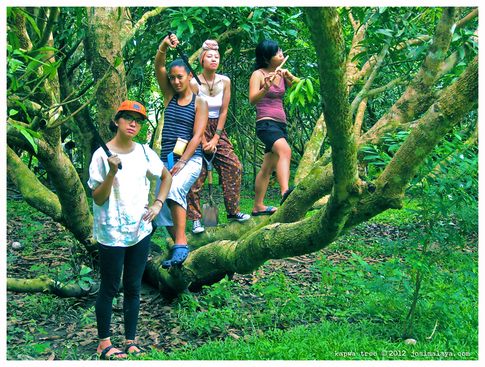
preparing to plant native trees in the bangkag (farm)
July 2012
At the KAPWA-3 conference, an elder taught us that when loggers clear-cut forests, you can hear the trees scream in anguish. When asked what happens if you plant trees with loving intent, they replied, "The trees will sing with joy."
After the conference, we made a journey to Ilocos Sur to visit the hometown of one of our kapwa's matrilineal family. During our stay we were taught how to plant native philippine trees for the purpose of "healing the earth and ourselves".
Guided by family, love and friendship, we planted 49 native trees with intent and in respectful dialogue with the land. Their names are Mahogany, Narra, Sagat/Yakal, White Lawan/Bagtikan, and Kalumpit.
As we planted, we whispered to the trees and encouraged them to grow strong roots; to know that they have a purpose in the world, and that they would never be alone because they belong to each other. In a healing garden. Planted with loving intent. In the spirit of kapwa. - jsa
At the KAPWA-3 conference, an elder taught us that when loggers clear-cut forests, you can hear the trees scream in anguish. When asked what happens if you plant trees with loving intent, they replied, "The trees will sing with joy."
After the conference, we made a journey to Ilocos Sur to visit the hometown of one of our kapwa's matrilineal family. During our stay we were taught how to plant native philippine trees for the purpose of "healing the earth and ourselves".
Guided by family, love and friendship, we planted 49 native trees with intent and in respectful dialogue with the land. Their names are Mahogany, Narra, Sagat/Yakal, White Lawan/Bagtikan, and Kalumpit.
As we planted, we whispered to the trees and encouraged them to grow strong roots; to know that they have a purpose in the world, and that they would never be alone because they belong to each other. In a healing garden. Planted with loving intent. In the spirit of kapwa. - jsa
_Beyond a wholesome discipline, be gentle with yourself. You are a child of the universe no less than the trees and the stars; you have a right to be here. And whether or not it is clear to you, no doubt the universe is unfolding as it should. - Desiderata
The Shared Self - Lost & Found: A Dialogue on Re-indigenization
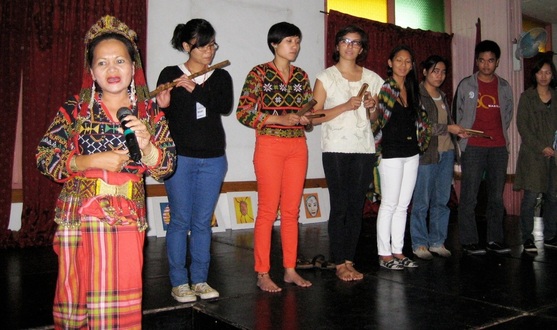
Ms. Rosie Sula shares "Koyu no Tabulul", a T'boli song about a tree on top of a mountain
June 2012
ACADEMIC THEORY, INDIGENOUS KNOWLEDGE & THE KAPWA PARADIGM
Friday June 29, 2012
2:50 – 3:30 PM
University of the Philippines (UP-Baguio)
At the KAPWA-3 panel, "The Shared Self - Lost & Found: A Dialogue on Re-indigenization" the Kapwa Collective embodied the expression of Earth, Fire, Water, and Air with conference participants.
Then the Singing Plants jammed with traditional teachers, Ms. Rosie Sula (Sikat-T'boli School of Indigenous Knowledge and Traditions) and Mr. Manuel Dulawan (Ifugao Academy), UP-Baguio students, and other new friends.
THE SHARED SELF – LOST & FOUND: A DIALOGUE ON RE‐INDIGENIZATION
Panel Discussants:
ACADEMIC THEORY, INDIGENOUS KNOWLEDGE & THE KAPWA PARADIGM
Friday June 29, 2012
2:50 – 3:30 PM
University of the Philippines (UP-Baguio)
At the KAPWA-3 panel, "The Shared Self - Lost & Found: A Dialogue on Re-indigenization" the Kapwa Collective embodied the expression of Earth, Fire, Water, and Air with conference participants.
Then the Singing Plants jammed with traditional teachers, Ms. Rosie Sula (Sikat-T'boli School of Indigenous Knowledge and Traditions) and Mr. Manuel Dulawan (Ifugao Academy), UP-Baguio students, and other new friends.
THE SHARED SELF – LOST & FOUND: A DIALOGUE ON RE‐INDIGENIZATION
Panel Discussants:
- Jennifer Maramba, Artist Healer, Toronto, Canada
- Jo SiMalaya Alcampo, Artist & Community Worker, Toronto, Canada
- Collective presentation by Christine Balmes, Aimee Gomez, Jennifer Maramba, Kristen Sison and Jo SiMalaya Alcampo
- Dr. Elizabeth de Castro, Co-discussant and Moderator
|
KAPWA-3 Collective Presentation
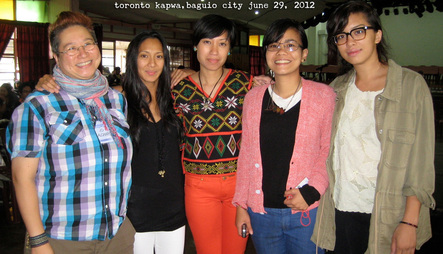
preparing to present at the KAPWA-3 conference
June 2012
I was honoured to accept an invitation from the Heritage and Arts Academies of the Philippines (H.A.P.I.) to speak at the KAPWA-3 Conference: "Indigenous Knowledge in the Academe - Bridging Local And Global Paradigms" held from June 28-30 at the University of the Philippines, in Baguio City.
I made the journey with a group of Filipino-Canadian artists, critical thinkers and healers from Toronto: Christine Balmes, Aimee Gomez, Jennifer Maramba, and Kristen Sison. We are committed to sharing the learning process with our communities. So in truth, we journey together.
I was honoured to accept an invitation from the Heritage and Arts Academies of the Philippines (H.A.P.I.) to speak at the KAPWA-3 Conference: "Indigenous Knowledge in the Academe - Bridging Local And Global Paradigms" held from June 28-30 at the University of the Philippines, in Baguio City.
I made the journey with a group of Filipino-Canadian artists, critical thinkers and healers from Toronto: Christine Balmes, Aimee Gomez, Jennifer Maramba, and Kristen Sison. We are committed to sharing the learning process with our communities. So in truth, we journey together.
What is KAPWA-3?
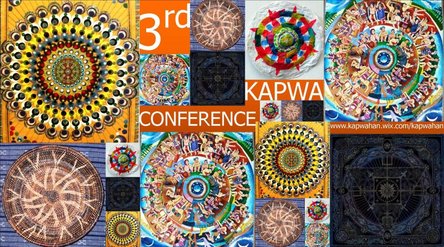
The KAPWA-3 Conference convenes formal scholars from diverse Philippine universities, representatives from Schools of Living Traditions, Filipino artists and cultural workers actively involved with preserving Indigenous Knowledge Systems and Practices (IKSP) in their lifeworks.
There will be international discussants from Japan, Thailand, Mongolia, the US and Canada whose research points to the importance of IKSP in formal education.
maraming salamat / many thanks to Kidlat Tahimik, Dr. Katrin de Guia, and the H.A.P.I. team for their hard work and dedication.
KAPWA-3 Conference website
There will be international discussants from Japan, Thailand, Mongolia, the US and Canada whose research points to the importance of IKSP in formal education.
maraming salamat / many thanks to Kidlat Tahimik, Dr. Katrin de Guia, and the H.A.P.I. team for their hard work and dedication.
KAPWA-3 Conference website
What is Kapwa?
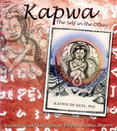
_Virgilio G. Enriquez (known as founder of Filipino Psychology /
Sikolohiyang Pilipino) initially proposed that a Filipino concept of
personhood centered on the core value expressed in the word Kapwa.
"Kapwa is a Tagalog term widely used when addressing another with the intention of establishing a connection. It reflects a viewpoint that beholds the essential humanity recognizable in everyone, therefore linking (including) people rather than separating (excluding) them from each other.
Enriquez felt that this orientation was an expression of “humanness at its highest level. Why? Kapwa, beyond all outer trappings, looks for what people have in common: not whether someone is rich or poor, not whether somebody is young or old, man, woman or child, but rather for the fundamental characteristics in people, that is, as human beings. According to this type of thinking, people always remain just people (tao lang) despite titles, prestigious positions or wealth. It’s their behavior and their ethics that count."
- Katrin de Guia, KAPWA the Self in the Other
"Kapwa is a Tagalog term widely used when addressing another with the intention of establishing a connection. It reflects a viewpoint that beholds the essential humanity recognizable in everyone, therefore linking (including) people rather than separating (excluding) them from each other.
Enriquez felt that this orientation was an expression of “humanness at its highest level. Why? Kapwa, beyond all outer trappings, looks for what people have in common: not whether someone is rich or poor, not whether somebody is young or old, man, woman or child, but rather for the fundamental characteristics in people, that is, as human beings. According to this type of thinking, people always remain just people (tao lang) despite titles, prestigious positions or wealth. It’s their behavior and their ethics that count."
- Katrin de Guia, KAPWA the Self in the Other
